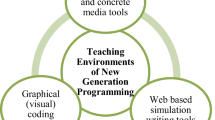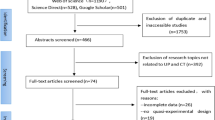Abstract
Fostering students’ computer programming ability has been recognized as being an important and challenging educational issue which is highly related to the process of problem solving. However, most existing computer programming instruction mainly focuses on the training of programming language syntax and programming skills, while the problem-solving concepts are often ignored. Thus, in this study, an integrated Scratch and project-based learning (PBL) approach is proposed to embed problem-solving scenarios in programming learning tasks. To test the effectiveness of the proposed approach, a total of 91secondary school students, including 43 average students and 48 mathematics-gifted students, participated in a PBL activity. The experimental results showed that the mathematics-gifted students outperformed the average students in terms of problem-solving performance, learning attitude, and learning motivation. Furthermore, both average and mathematics-gifted students showed significant progress after the learning activity, implying that the proposed approach benefited all of the students, no matter whether they tended to be gifted in mathematics or not.

Similar content being viewed by others
References
Anderson-Cruz, H., & Vik, G. N. (2007). Using project-based learning to connect theory to practice in teaching accounting communication. Association for Business Communication.
Briggs, S. R., & Check, J. M. (1986). The role of factor analysis in the development and evaluation of personality scales. Journal of Personality, 54, 106–148.
Chu, H. C., & Hwang, G. J. (2010). Development of a project-based cooperative learning environment for computer programming courses. International Journal of Innovation and Learning, 8(3), 256–266.
Çiftçi, S., & Baykan, A. A. (2013). Project based learning in multi-grade class. Educational Research and Reviews, 8(3), 84–92.
Feldhusen, J. F. (1991). Effects of programs for the gifted: A search for evidence. In W. Southern & E. Jones (Eds.), The academic acceleration of gifted children (pp. 33–147). New York: Teachers College Press.
Fredricks, J., Blumenfeld, P., & Paris, A. (2004). School engagement: Potential of the concept, state of the evidence. Review of Educational Research, 74, 59–109.
Hung, C.-M., Hwang, G.-J., & Huang, I. (2012a). A project-based digital storytelling approach for improving students’ learning motivation, problem-solving competence and learning achievement. Educational Technology & Society, 15(4), 368–379.
Hung, P. H., Hwang, G. J., Lin, I. H., & Su, I. H. (2012b). The characteristics of gifted students’ ecology inquiries in ubiquitous learning activities. International Journal of Mobile Learning and Organisation, 6(1), 52–63.
Hwang, G. J., & Chang, H. F. (2011). A formative assessment-based mobile learning approach to improving the learning attitudes and achievements of students. Computers & Education, 56(1), 1023–1031.
Hwang, W. Y., Wang, C. Y., Hwang, G. J., Huang, Y. M., & Huang, S. (2008). A web-based programming learning environment to support cognitive development. Interacting with Computers, 20(6), 524–534.
Hwang, G. J., Wu, C. H., Tseng, Judy C. R., & Huang, I. W. (2011). Development of a ubiquitous learning platform based on a real-time help-seeking mechanism. British Journal of Educational Technology, 42(6), 992–1002.
Kirk, S. A., Gallagher, J. J., & Anastasiow, N. J. (2000). Educating exceptional children. Boston: Houghton Mifflin.
Kubilius, P. O., & Lee, S. Y. (2004). The role of participation in-school and outside-of-school activities in the talent development of gifted students. Journal of Secondary Gifted Education, 15(2), 107–124.
Markham, T., Mergendoller, J., Larmer, J., & Ravitz, J. (2003). Project based learning handbook: A guide to standards-focused project based learning (2nd ed.). Novato: Buck Institute for Education.
Mohamed, N. (2012). Enhancing the project-based learning experience through the use of live web data. International Journal of Modern Education and Computer Science, 11, 33–43.
Monroy-Hernández, A., & Resnick, M. (2008). Empowering kids to create and share programmable media. Interactions, 15(2), 50–53.
Moreno, J. (2012). Digital competition game to improve programming skills. Educational Technology & Society, 15(3), 288–297.
Musa, F., Mufti, N., Latiff, R. A., & Amin, M. M. (2011). Project-based learning: Promoting meaningful language learning for workplace skills. Procedia Social and Behavioral Sciences, 18, 187–195.
Okamoto, M., Kita, H., Ono, I., Kiga, D., Terano, T., Yamada, T., & Koyama, Y. (2008). Project-based learning of computer programming using an artificial market system. In J. Luca & E. Weippl (Eds.), Proceedings of EdMedia: world conference on educational media and technology 2008 (pp. 4545–4553). Association for the Advancement of Computing in Education (AACE).
Özdamlı, F. (2011). The experiences of teacher candidates in developing instructional multimedia materials in project based learning. Procedia Social and Behavioral Sciences, 15, 3810–3820.
Peppler, K., & Kafai, Y. (2007). From SuperGoo to Scratch: Exploring media creative production in an informal learning environment. Journal on Learning, Media, and Technology, 32(2), 149–166.
Pintrich, R. R., & DeGroot, E. V. (1990). Motivational and self-regulated learning components of classroom academic performance. Journal of Educational Psychology, 82, 33–40.
Ravitz, J., Hixson, N., English, M., & Mergendoller, J. (2012). Using project based learning to teach 21st Century skills: Findings from a statewide initiative. Paper presented at Annual Meetings of the American Educational Research Association, Vancouver, Canada.
Reeve, J. (2006). Teachers as facilitators: What autonomy-supportive teachers do and why their students benefit. The Elementary School Journal, 106(3), 225–236.
Resnick, M., Maloney, J., Monroy-Hernández, A., Rusk, N., Eastmond, E., Brennan, K., et al. (2009). Scratch: Programming for all. Communications of the ACM, 52(11), 60–67.
Schaffer, S., Chen, X., Zhu, X., & Oakes, W. C. (2012). Self-efficacy for cross-disciplinary learning in project-based teams. Journal of Engineering Education, 101(1), 82–94.
Tanrikulua, E., & Schaefer, B. C. (2011). The users who touched the ceiling of scratch. Procedia-Social and Behavioral Sciences, 28, 764–769.
Taylor, M., Harlow, A., & Forret, M. (2010). Using a computer programming environment and an interactive whiteboard to investigate some mathematical thinking. Procedia Social and Behavioral Sciences, 8, 561–570.
VanTassel-Baska, J. (1994). Comprehensive curriculum for gifted learners (2nd ed.). Boston: Allyn and Bacon.
VanTassel-Baska, J., & Stambugh, T. (2006). Comprehensive curriculum for gifted learners (3rd ed.). Boston: Allyn & Bacon.
Yang, T.-C., Hwang, G.-J., Yang, S. J. H., & Hwang, G.-H. (2015). A two-tier test-based approach to improving students’ computer-programming skills in a web-based learning environment. Educational Technology & Society, 18(1), 198–210.
Acknowledgments
This study is supported in part by the National Science Council of the Republic of China under contract numbers NSC 101-2511-S-011 -005 -MY3 and NSC 102-2511-S-011 -007 -MY3.
Author information
Authors and Affiliations
Corresponding author
Rights and permissions
About this article
Cite this article
Wang, HY., Huang, I. & Hwang, GJ. Comparison of the effects of project-based computer programming activities between mathematics-gifted students and average students. J. Comput. Educ. 3, 33–45 (2016). https://doi.org/10.1007/s40692-015-0047-9
Received:
Revised:
Accepted:
Published:
Issue Date:
DOI: https://doi.org/10.1007/s40692-015-0047-9




